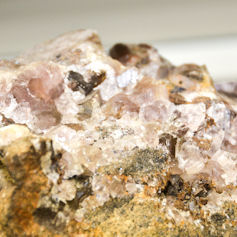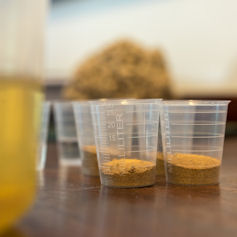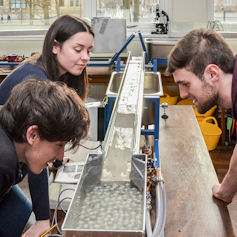
Earth and planetary science
We study the origins and evolution of the Earth, its atmosphere, oceans and life, and of the other planets and minor bodies in our Solar System.
Our facilities
We use a range of contemporary tools and facilities to conduct our research, including our Advanced Isotope Geochemistry and Cosmochemistry Suite, and the instruments in our Williamson Research Centre and Centre for Atmospheric Science.
Studying the Earth and Solar System is fundamental to understanding the processes by which the Earth and other planets formed, allowing life to prosper. Our ability to forecast the impact of human activities relies on our understanding of the Earth system.
The Earth is not always a benign place, and our capacity to manage natural hazards depends on our knowledge of the frequency and magnitude of earthquakes, eruptions and floods, and our understanding of weather and the atmosphere.
The atmosphere is also integral to the Earth's climate and (bio)geochemical cycles, and studying its composition and dynamics are key to Earth system science.

The geological processes that produced the mineral and fossil fuel reservoirs that still sustain much of human activity are underpinned by the study of sedimentary processes and structural geology.
Our research uses an integrated and interdisciplinary approach to study the processes that have formed the Earth and other planets as they are today. We investigate fundamental questions to provide a framework to address key challenges for humanity in the future.
Research highlights
Our researchers study the fate of plastic waste
Mismanaged plastic waste entering rivers is concerning, and has a severe negative impact on ecosystems at land and sea. A team of researchers from the Universities of Manchester and Bergen have used landscape modelling, plastic production history, and numerical simulations to estimate the input of plastic waste to global river systems, and the fate of those plastics. The teams showed that plastic fate depends on the river type and its setting, which has implications for the retention, fragmentation, and biochemical weathering rates of plastics. The research shows that future river system dynamics should form the basis for targeted strategies to mitigate the impact of plastic waste, and are key to environmental risk assessments.
Solving the mystery of the missing iron-rich meteorites
Meteorites provide key insights into the geology of other planets, and one of the best places to hunt them down is Antarctica. A team of mathematicians and earth scientists from our Department have recently solved a long-standing conundrum - fewer iron-rich meteorites have been found in Antarctica than anywhere else on Earth. The solution? It seems that the amount of iron in the meteorite sample dictates how efficiently it heats up. Iron-rich meteorites heat more, and so sink through the ice.
-
Ancient life
The evolution of life is intimately connected with the geological evolution of the Earth. Major insights into evolution and geology are possible through studying the history of life in deep time. Our Interdisciplinary Centre for Ancient Life uses multidisciplinary approaches - including X-ray, computational, biomolecular and evolutionary techniques - to understand how life today came to be.
Read more
-
Basins, stratigraphy and sedimentary processes
Sedimentary rocks and their stratigraphy provide an archive of Earth's history, its climate and fossil record. They are the sites of accumulations of hydrocarbons, minerals and groundwater. Our research incorporates all aspects of sedimentary geology and the associated basin systems.
Read more
-
Climate and weather in the Earth system
The climate and weather are integral parts of the Earth system. Our Centre for Atmospheric Science investigates chemical and physical processes from the formation and evolution of single aerosol particles to cloud microphysics and interactions with meteorological dynamics to improve our understanding of weather phenomena and the climate system.
Read more
-
Geochemistry
Geochemistry is the study of chemical processes that controlled the formation of the Solar System, and terrestrial processes that control how the Earth systems works, from subduction to biogeochemical cycles. Our research includes isotope geochemistry, organic geochemistry and the impact of life in the form of biogeochemistry.
-
Geophysics
Major insights into the structure and processes of Earth have come through Geophysics, which uses physics-based techniques such as seismology, ground-deformation and electrical properties to probe the Earth's interior. We use these methods to investigate erosion, tectonics, sedimentation and volcanism in the oceans.
Read more
-
Geomorphology
Geomorphology is the study of landscapes on the Earth and elsewhere in the solar system, allowing us to understand the processes that shape and transform the world and planets around us. Our research focuses on the links between climate change and tectonics, and the history of planetary surfaces and water flow.
Read more
-
Petrology and volcanology
Volcanoes produce Earth's hydrosphere and atmosphere, and threaten the lives of millions around the world. Our volcanic process research improves our understanding of geochemical cycles and helps to mitigate risks posed by eruptions. Our petrology research reveals the history of volcanic rocks, studies intrusive magmatic processes and probes how sedimentary rocks transform under high pressure.
Read more
-
Planetary science
Our planetary scientists seek to understand the origins and evolution of the Solar System's diverse environments and how they operate today. Our research includes laboratory analysis of meteorites and samples returned by space missions such as Apollo. We also use observations made from Earth to learn about volcanoes, impact cratering and atmospheres on other planets.
Read more
-
Structural geology and rock physics
Fault systems and how they respond to stress depends on the physical properties of the rocks involved. Through a combination of field observation and laboratory experiment we unravel the processes that play a key role in processes as diverse as fracking, carbon sequestration and magma chamber evolution.
Read more
Areas of expertise
Our researchers focus their work in the following specialist areas:




List180x180.jpg)
